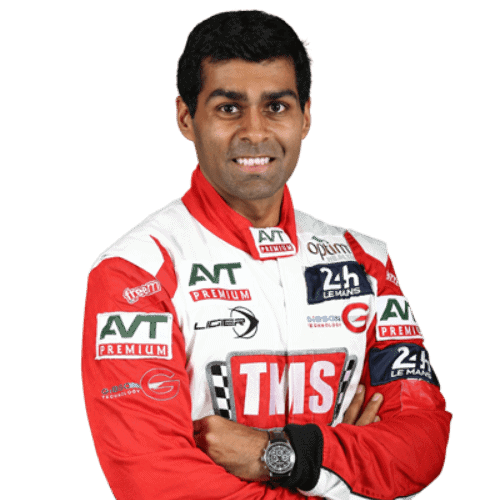To receive the downloadable spreadsheet of the podcast list, please provide us with your name and email address below. We'll send you the list via email shortly after you submit your information.

Karun Chandhok
Racing driver who made his Formula One debut in the 2010 season racing for the HRT team
Karun Chandhok is one of only two Indian F1 drivers – and now a Sky Sports commentator. Karun is a member of Motorsport UK’s Equality, Diversity and Inclusion Committee and sits on its Racial Diversity Sub-Committee. And as a member of the FIA Drivers’ Commission, he is an advocate for the rights and views of drivers across the world.
Karun Chandhok's videos
Available for
Languages:
- English
Karun Chandhok's 2024 biography
Meet Karun Chandhok
Karun Chandhok is one of only two Indian drivers to compete in Formula 1 and one of the most respected broadcasters in the sport today. Born into a family which was steeped in motor sport history, Karun rose through the ranks of junior formulae racing to become test driver for the Red Bull Racing Formula 1 team in 2007/8. He competed in the Formula 1 World Championship for Hispania Racing Team and Team Lotus in 2010 and 2011.
Today he is an expert analyst for Sky Sports F1, broadcasting to 62 countries. He previously broadcast for Star Sports in Asia, BeIN Sports in Qatar, BBC 5 Live Radio and Channel 4 TV in the UK. His deep insights and superb delivery make him one of the most popular presenters in Formula 1. As a result, he can speak about any aspect of this demanding sport, particularly given his wide range of experience from across the industry.
Karun sits on the Board of Motorsport UK, the national governing body of motorsport and one of the key members of the world’s governing body, the FIA. He is a member of Motorsport UK’s Equality, Diversity & Inclusion Committee and also devotes time to working on the development of junior single seater formulae.
In 2013 he became a member of the first ever FIA Driver’s Commission and continues to represent the rights and views of drivers from across the world. His work with the FIA includes being a member of the Single Seater Commission and Driver Grading Committee.
During his career Karun has worked closely with Formula 1 and its then-CEO Bernie Ecclestone to deliver the Indian Grand Prix. He also consulted for Nissan, managing the Indian cohort of its famed GT Academy programme. He also worked closely with Indian manufacturers Tata and Mahindra.
Born in Chennai, Karun first came to prominence in motor racing when he won the 2000 Indian National Championship in his debut season. The following year he won the Formula Asia Championship before moving into Formula 3, the Asian Renault V6 series and finally GP2 – the final step before Formula 1.
His two year experience of competing in Formula 1 with HRT and Team Lotus was followed by six years in sports car racing, including racing in the world famous Le Mans 24 Hours event. He also competed in Formula E with Mahindra, giving him a valuable insight into the fast-developing electric series.
Since 2016 Karun has worked closely with the Williams F1 Team’s Heritage division, testing and show-casing some of the team’s most famous World Championship-winning cars. He continues to compete in historic racing, notably at Goodwood, and his annual ‘Karun’s Karting Carnival’ event in the UK raises funds for underprivileged children in India.
Karun Chandhok's 2024 speaking fees
- United Kingdom
Specific fees fall within the ranges shown. These are presented as a guide only and are subject to change without notice.
To get an exact quote for your event, click the button below.
